The Big One: Canada floods show British Columbia is not ready for a powerful earthquake
As the province rebuilds after the atmospheric river, experts hope for a heightened focus on future quake hazards
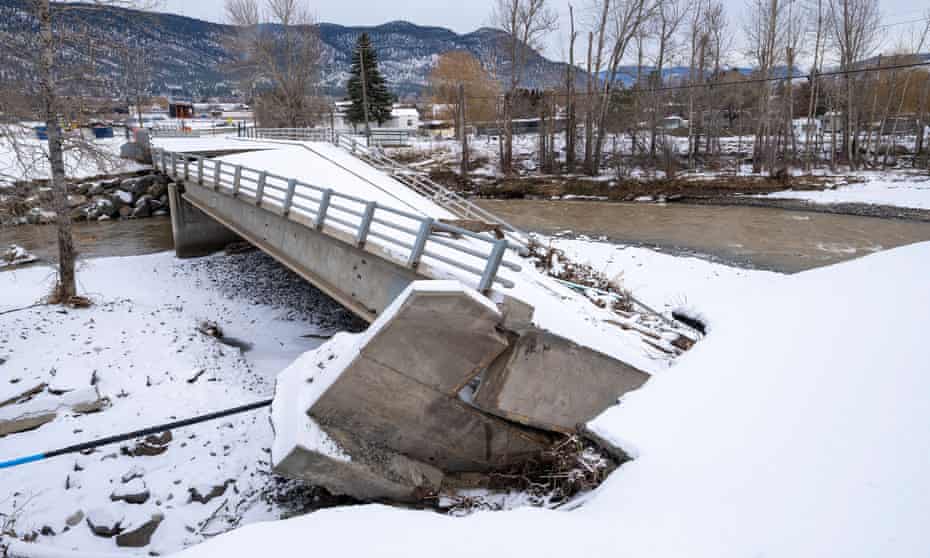
A bridge in Merritt, British Columbia, was damaged in the flooding.
Photograph: Canadian Press/REX/Shutterstock
Leyland Cecco in Victoria, British Columbia
Sun 19 Dec 2021
Canada’s largest port is shut down. Highways have snapped, buckled and crumbled. Bridges are washed into raging rivers and landslides rumble down mountainsides, burying cars and stranding travellers. Rail lines linking the west coast to the rest of North America are damaged. Oil pipelines cease operating.
Three years ago, officials at Vancouver’s main transport hubs were told to prepare for a scenario in which nearly 3 million people in south-western British Columbia were cut off from the rest of the country.
Those warnings became a reality in mid-November when the region was hit by record rainfall, flooding and landslides. But in their meeting, officials had gathered to plan for a far more devastating disaster: a powerful earthquake, known as the Big One, that has long been predicted to strike the region.
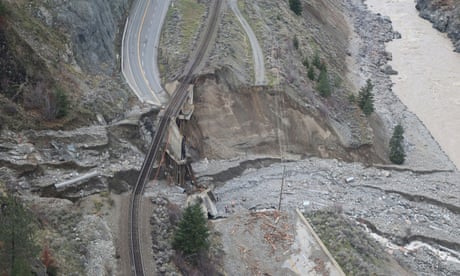
Floods and wildfires are now normal life in small-town Canada
The widespread destruction from the flooding has highlighted the vulnerability of the region’s infrastructure, but experts warn that if the province fails to learn from the current crisis, it faces larger, deadlier and costlier disasters in the future.
Leyland Cecco in Victoria, British Columbia
Sun 19 Dec 2021
Canada’s largest port is shut down. Highways have snapped, buckled and crumbled. Bridges are washed into raging rivers and landslides rumble down mountainsides, burying cars and stranding travellers. Rail lines linking the west coast to the rest of North America are damaged. Oil pipelines cease operating.
Three years ago, officials at Vancouver’s main transport hubs were told to prepare for a scenario in which nearly 3 million people in south-western British Columbia were cut off from the rest of the country.
Those warnings became a reality in mid-November when the region was hit by record rainfall, flooding and landslides. But in their meeting, officials had gathered to plan for a far more devastating disaster: a powerful earthquake, known as the Big One, that has long been predicted to strike the region.

Floods and wildfires are now normal life in small-town Canada
The widespread destruction from the flooding has highlighted the vulnerability of the region’s infrastructure, but experts warn that if the province fails to learn from the current crisis, it faces larger, deadlier and costlier disasters in the future.
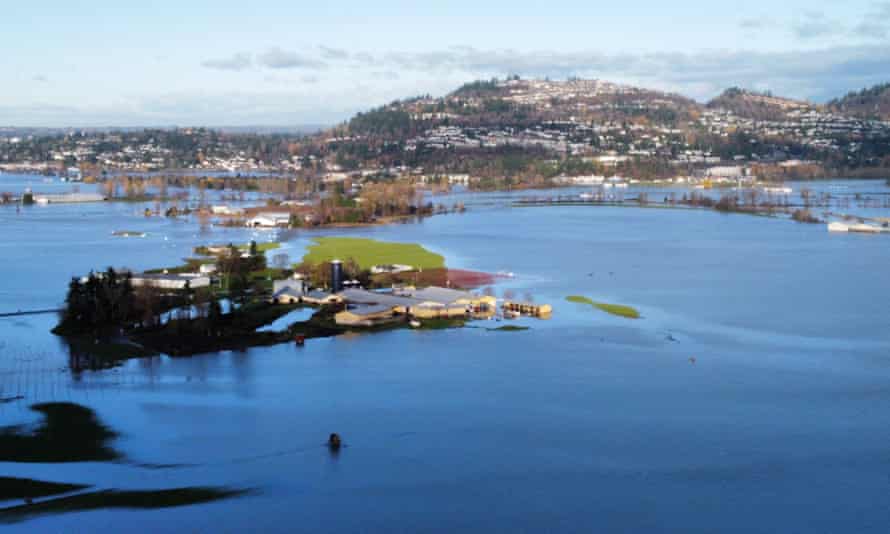
Houses and farms became islands after record rainfall in Abbotsford, British Columbia. Photograph: David Pemble/AFP/Getty Images
Geologists say a massive earthquake will almost certainly hit south-western British Columbia in the coming years, with the odds as high as 30% over the next half-century. Residents have long feared the Big One, a rupture of the Cascadia subduction zone far offshore that will unleash a tsunami and inflict widespread destruction.As many as 10,000 people could die in southern British Columbia and the Pacific north-west of the United States. Fires alone could cause as much as C$10bn in damage. Water lines will be severed. First responders could be unable even to leave their stations.
Geologists say a massive earthquake will almost certainly hit south-western British Columbia in the coming years, with the odds as high as 30% over the next half-century. Residents have long feared the Big One, a rupture of the Cascadia subduction zone far offshore that will unleash a tsunami and inflict widespread destruction.As many as 10,000 people could die in southern British Columbia and the Pacific north-west of the United States. Fires alone could cause as much as C$10bn in damage. Water lines will be severed. First responders could be unable even to leave their stations.
The last large quake in the area – the Cascadia megathrust in 1700 – was strong enough for its effects to be felt all the way across the Pacific in Japan.
But the Cascadia plate boundary has been “eerily quiet” for many years, said Edwin Nissen, a seismologist at the University of Victoria. “Most people here likely haven’t actually felt an earthquake in their lifetime. And so they’re a bit disconnected from what could happen.”
Even a smaller quake could prove catastrophic if it strikes closer to an urban centre.
“The danger is that there could be a bullseye hit on one city,” said Nissen, pointing to the 2011 quake that struck Christchurch, New Zealand, the effects of which are still visible a decade later. “A localized quake could be far more devastating even than the Big One.”
But experts also say the recent flooding in the province has given the region a rare glimpse into its fragility – and a chance to fix that.
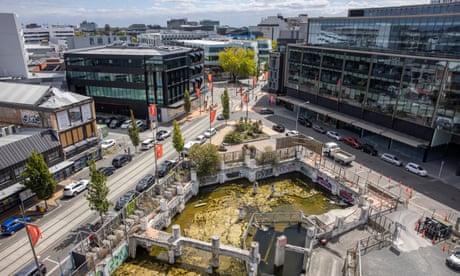
Before and after: how the 2011 earthquake changed Christchurch
“People don’t appreciate the importance of critical infrastructure until you see a flaw in it,” said Jean Slick, head of the disaster management program at Victoria’s Royal Roads university. “When they’re in our own back yard, it gives us this opportunity to understand the threat in a completely different way.”
Officials in British Columbia have faced criticism for never activating the mobile emergency alert system even as it became clear that days of heavy rain would have a devastating effect on communities. Meanwhile, evidence suggests the province knew its diking system, which failed, wasn’t up to standard. Residents forced from flood-ravaged areas detailed days of confusion when searching for shelter.
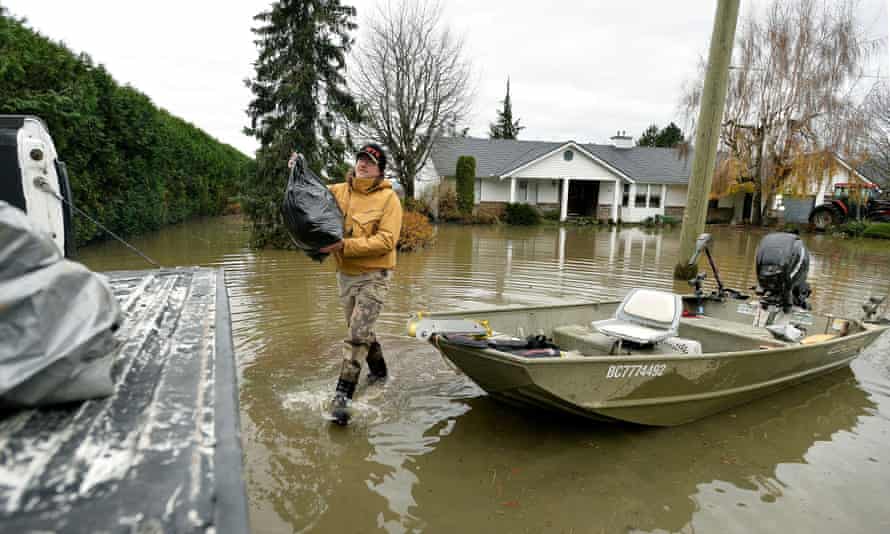
Houses in Abbottsford were uninhabitable.
Photograph: Jennifer Gauthier/Reuters
One month after the floods, British Columbia remains in a state of emergency. Gas is rationed in major coastal cities and at least one major highway system will take months to fully repair and thousands have lost their homes. Landscapes have been altered and the route of at least one major river has changed.
But as the province begins the difficult task of cleaning up and rebuilding, experts hope the floods will also help the public understand the risks that emerge from urban planning decisions.
“When you get the premier and ministers saying this is a natural disaster, we’re left thinking that nature did this to us. But there are no natural disasters. Flooding is a natural hazard. We build and live and work in floodplains. We’re the ones that create disaster risk,” she said. “The question is, how do we live with risk?”
Slick, who served as an expert adviser on the BC auditor general’s report into the province’s earthquake preparedness, says recent events have had a “focusing” effect on how people understand natural hazards and risk. Empty store shelves and panic buying from both the pandemic and floods have exposed the costs of ignored warnings and the importance of preparing for future crises.
“When we rebuild, let’s not put blinders on and just focus on floods. Let’s make sure that we’re considering all hazards, like climate risks and earthquakes,” she said.
But rebuilding often comes with an eagerness to return to normal as quickly as possible.
“There’s going to be a rush to rebuild, and [there’s pressure] to put things back the way they were before,” said Glenn McGillivary, managing director of the Institute for Catastrophic Loss Reduction. “But is anybody going to stop and say, ‘Hey, wait a minute, why don’t we build this thing better, so we’re not doing this again in two more years?”
Even simple changes can lead to outsized benefits. As one of the province’s natural gas providers upgrades its metering system, McGillivary and others have called for seismic shut-offs to be installed on every line, as is common in Japan, to prevent fires after an earthquake.
But previous studies suggests British Columbia remains unprepared for a large tremor.
“We know that there will be a big earthquake, but we’re still not as prepared as we should be. And scientists are saying atmospheric rivers will get much stronger due climate change and flooding would get much worse,” said Nissen.
“That next big earthquake could be 100 years away. That’s not even in our lifetime. It almost feels hypothetical,” he said. “The cost of doing something is astronomical. But the cost of doing nothing is even worse.”
One month after the floods, British Columbia remains in a state of emergency. Gas is rationed in major coastal cities and at least one major highway system will take months to fully repair and thousands have lost their homes. Landscapes have been altered and the route of at least one major river has changed.
But as the province begins the difficult task of cleaning up and rebuilding, experts hope the floods will also help the public understand the risks that emerge from urban planning decisions.
“When you get the premier and ministers saying this is a natural disaster, we’re left thinking that nature did this to us. But there are no natural disasters. Flooding is a natural hazard. We build and live and work in floodplains. We’re the ones that create disaster risk,” she said. “The question is, how do we live with risk?”
Slick, who served as an expert adviser on the BC auditor general’s report into the province’s earthquake preparedness, says recent events have had a “focusing” effect on how people understand natural hazards and risk. Empty store shelves and panic buying from both the pandemic and floods have exposed the costs of ignored warnings and the importance of preparing for future crises.
“When we rebuild, let’s not put blinders on and just focus on floods. Let’s make sure that we’re considering all hazards, like climate risks and earthquakes,” she said.
But rebuilding often comes with an eagerness to return to normal as quickly as possible.
“There’s going to be a rush to rebuild, and [there’s pressure] to put things back the way they were before,” said Glenn McGillivary, managing director of the Institute for Catastrophic Loss Reduction. “But is anybody going to stop and say, ‘Hey, wait a minute, why don’t we build this thing better, so we’re not doing this again in two more years?”
Even simple changes can lead to outsized benefits. As one of the province’s natural gas providers upgrades its metering system, McGillivary and others have called for seismic shut-offs to be installed on every line, as is common in Japan, to prevent fires after an earthquake.
But previous studies suggests British Columbia remains unprepared for a large tremor.
“We know that there will be a big earthquake, but we’re still not as prepared as we should be. And scientists are saying atmospheric rivers will get much stronger due climate change and flooding would get much worse,” said Nissen.
“That next big earthquake could be 100 years away. That’s not even in our lifetime. It almost feels hypothetical,” he said. “The cost of doing something is astronomical. But the cost of doing nothing is even worse.”
No comments:
Post a Comment